Oleg Valetsky about the wars in the Balkans, their causes and Russian volunteers
Oleg Valetsky - author of books and numerous publications on storiestheory and practice of fighting in the former Yugoslavia. Participant in the hostilities of the war in the Balkans: in Bosnia and Herzegovina (Army of the Republika Srpska) in 1993-95, in Kosovo and Metohija (Army of Yugoslavia) in 1999, in Macedonia (Sun Macedonia) in 2001. Has four combat wounds . From September 1996 to April 2008 worked in demining organizations in the territories of the former Yugoslavia, Iraq and Afghanistan.
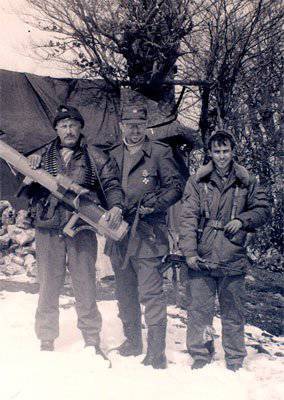 Russian volunteers in March 1993 of the year on positions on the mountain of Zaglavak under Gorazde with a Yugoslav-made M-79 anti-tank grenade launcher.
Russian volunteers in March 1993 of the year on positions on the mountain of Zaglavak under Gorazde with a Yugoslav-made M-79 anti-tank grenade launcher.Tell us about how you ended up in the Balkan war.
I participated in the revival of the Cossacks with 1991 and thus met in Moscow with the Cossacks, who had already fought in Bosnia. There was ataman Viktor Z., through whom he joined the group of Cossacks, who went to a Cossack detachment who had been in Vysehrad since December 1992.
What was this war for you? For you, she stayed in the past or does not want to let go of yourself?
Yes, there is a difficult question. In general, it was interesting. As for letting go or not, I do not belong to people who are nostalgic for the past. That was, that was, and to regret what entered voluntarily and consciously - stupid. For me, all this is in the past, and therefore I do not participate in various local veteran events.
Another thing is that I try to preserve the memory of that war in my books and articles. I also think that the big deal was that in 2011, a monument to Russian volunteers was erected at the military cemetery at the church in Vyshegrad, in which I had the opportunity to render my feasible, albeit small, help.
This monument was built with the financial support of the director of the Russian Bank Trust Ilya Yurov, who also took on the costs of organizing the arrival of several groups of families of the dead volunteers. Thus, the monument is quite naturally built by the Russians to preserve the memory of those who were in the movement of Russian volunteers that arose, above all, for the sake of Russia itself.
Of course, assistance was provided from the Serbian side - the manufacture and installation of the monument, as well as the grand opening, was organized by the Serbian-Russian Friendship Society Zavet from Belyan, whose chairman Sava Cvetinovic was the head police officer of Belyany in 90. It was he who contributed to the introduction of the Russian peacekeeping contingent in 1996 in the area of responsibility of his police department in Uglevik.
It is also significant that this monument stands on the church ground of the city, in which from November 1992 to May 1993 there were four groups of Russian volunteers, which marked the beginning of the Russian volunteer movement in Bosnia, which was continued in 1999 in Kosovo. At the same time, we must pay tribute to the authorities of the Republika Srpska, who, despite the enormous pressure exerted on them, nevertheless approved the installation of the monument. The Vyshehrad community issued a free transfer of church land, and the Veteran Organization of the Republika Srpska also provided financial resources to the Society for the Serbian-Russian Friendship "Testament" for organizing the grand opening of the monument. Allocated funds for this discovery and the office of the President of the Republic of Serbian Milorad Dodik, who personally arrived at the opening of the monument, as well as the Minister of Veterans Affairs and Social Protection of the Republic of Serbian Petar Jokic.
 Opening of the monument to Russian volunteers in Vyshegrad at the military cemetery. 2011
Opening of the monument to Russian volunteers in Vyshegrad at the military cemetery. 2011It is impossible to mention all those who assisted in the city described by Iva Andrich over the Drina River, was put to death in memory of the deceased volunteers and in this case I would like to thank them.
You have written a great book called the Yugoslav War, in which you share memories and military experiences. Is this your only book at the moment?
No, here are my other books written: "White Wolves (Serbian diary of Russian volunteer 1993-1999)" (Grifon Publishing House - Moscow. 2006 year), "New strategy of the USA and NATO and its influence on the development of foreign weapons systems and Ammunition "(Arktika Publishing House, Moscow 2008 Year)," Mine weapon. Mining and demining issues "(Publisher: Kraft +, 2009 g.)," Yugoslav war 1991-1995 "(Kraft + publishing house, Moscow 2011 year).
In which countries and regions besides Bosnia did you take part in military conflicts?
After Bosnia, I volunteered to fight in Kosovo as part of the Yugoslav army in 1999, and in 2001, I was invited as an instructor to the armed forces of Macedonia, who fought against the Albanian militants. In Macedonia was in July-August 2001
After the war in Bosnia, a demining program began under the control of the UN, the US and the EU. Sappers were recruited from the local, to which I already belonged. Firms were American and English. Along the same line, 2003 began to recruit practically the same American and British managers that controlled demining and people to protect in Iraq and then in Afghanistan. They recruited both Serbs and Muslims. I was able to leave for 2004. First to Iraq, then to Afghanistan.
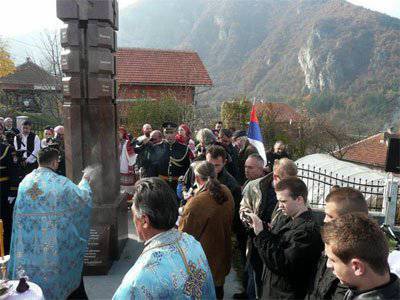 Opening of the monument to Russian volunteers in Vyshegrad at the military cemetery. 2011
Opening of the monument to Russian volunteers in Vyshegrad at the military cemetery. 2011How many Russian volunteers participated in the Balkan war? Tell about them.
I think in total, 600-700 people. I wrote the book "White Wolves" (the name, by the way, not mine) about it. I cannot add anything, especially since I kept the principle in detail about names and surnames to speak only about the dead. The list of the dead you provided with biographies.
The only thing I can add is about Dmitry Bogachev, a Cossack volunteer who fought in Serbian Krajina in 1993, near Sarajevo in 93-94 and in Kosovo in 1999 and who tragically died in Nizhny Novgorod a month ago.
Do the Serbs remember the feat of Russian volunteers?
Yes, not really remember. Serbs and about their something not remember. I do not want my words to be perceived in an erroneous context, and therefore I will explain in detail.
Contrary to the common cliché, now in the Serbian society in power are traffickers in the worst sense of the word. These traders can be in jackets or uniforms, they can work in a legal field or in crime, they can have millions of states, and there can be millions of debts - this does not change the essence. For them in the first place is their ego and, accordingly, material gain, for which they will sell anything and anyone.
Of course, those who stood out in the war in some way do not need them, for they only see themselves as the “heroes” of the day and this, by the way, produces an incredible amount of false heroes.
There are plenty of explanations from historical to political, but the consequences are such that in modern Serbian society there is no need for our own military heroes, let alone foreign ones.
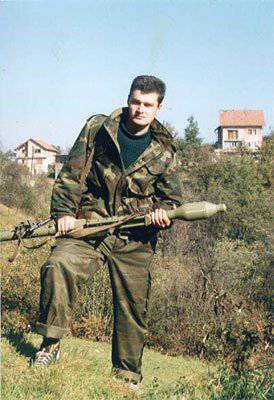 Russian volunteer Oleg Bondarets from Kiev with a M-57 anti-tank grenade launcher of Yugoslav production in Sarajevo. He died in Sarajevo 20 November 1995 of the year on Ozrenskaya Street as part of the Second Battalion of the 1 th Sarajevo Brigade.
Russian volunteer Oleg Bondarets from Kiev with a M-57 anti-tank grenade launcher of Yugoslav production in Sarajevo. He died in Sarajevo 20 November 1995 of the year on Ozrenskaya Street as part of the Second Battalion of the 1 th Sarajevo Brigade.In this case, we can recall the history of ancient Israel described in the Old Testament, in which the spiritual heights of the people coexisted with its deepest falls, for Orthodox Serbs, like other Christian nations in the past, were perceived as "New Israel" and, obviously, once Serbs believe Orthodox, then those of Israel, according to the Orthodox theology and are.
At the same time, the Serbian society, even by its structure, based initially on tribal ties, corresponds to the structure of former Israel. The history of the Serbs, as the struggle is not for political power and territory, but for the preservation of the Orthodox faith, is also most closely related to the history of Israel.
Now the Serbian society is in deep crisis, the reasons for which need to be written too much, but it’s now pointless to deny the excessive self-esteem of the Serbs, both individual and collective, which strikes many representatives of this strong spirit of the people to lose their sobriety. By virtue of this, in relation to politics, society and religion, assessments are made that amaze with their absurdity, whereas on a personal level, those who endure them are distinguished by their very earthly sanity.
It is also obvious that the return of the Serbian people to the former ideals based on Orthodoxy is a fact that does not make sense to prove. It is not in the interest of the forces in the world that are called the New World Order.
Thus, Russian volunteers - a symbol of unity between two Orthodox nations, are an absolutely unnecessary symbol in Serbian history, which apologists of various political forms of this order try to erase. They succeed due to the fact that in practice, not all volunteers meet this standard.
You said that not all Russian volunteers corresponded to the symbol of unity between the two Orthodox nations. Explain.
The recruitment of volunteers itself went through the Russian opposition of those times, and you remember that at that time in the Russian Federation there was no opposition in its Western sense. The state apparatus was dissatisfied with the collapse of the USSR, and then Yugoslavia was considered one of the fronts of the struggle for the restoration of the USSR.
Of course, it all lasted until October 1993, and then it went down. Therefore, relatively speaking, if groups traveled until October, or at least there were plans to send such groups, then after 1993, there was no one to go.
In addition, the Serbian authorities themselves quickly refused to cooperate with the Russian opposition. And as if the Serbian government did not curse Yeltsin at home, but had no desire to support his opposition — neither the nationalists, nor the communists.
After the Russian opposition lost the ability to organize groups, for which support was needed in the apparatus, where such support would be dangerous after 93 was after October, the Serbian authorities did not intend to do anything themselves. The maximum that the representative of the RS, Todor Dutin, could do in the representative office of the Republika Srpska was to give money for a ticket on some recommendations to several people, but nothing more, and I did not hear about that.
However, since the troops arose and wrote about them, loners were drawn to Bosnia. There were people of different biographies and abilities, so it is necessary to separate the movement itself and the volunteers, especially since people who are completely indifferent to national ideas and, in general, to some ideas have got into.
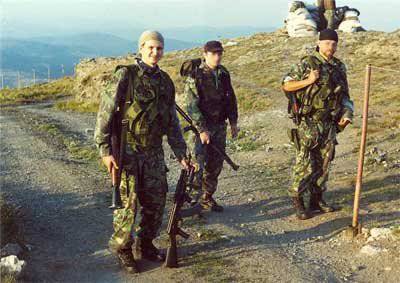 Russian volunteers in the Macedonian special forces unit.
Russian volunteers in the Macedonian special forces unit.You have four wounds, tell us how you got them.
The first is a bullet in the thigh, I got under Vyshegrad when, during the battle, I and one friend from Ukraine, Timur, launched a counterattack against the enemy and found themselves in the rear.
The second is the fragments of a bursting bullet in the back, when in the group of Chetniks Slavko Aleksic broke through the enemy's defensive line near Tarnovo in July 1993 during the largest operation of the Bosnian Serb army.
The third time was the fragments of a hand grenade, when the enemy’s trenches were stormed near Sarajevo, in the Zlatishte region, when one grenade exploded at the foot.
Fourth, the fragments of a hand grenade in the leg and arm, when the enemy's trenches were stormed in the Nishichi region, not far from Sarajevo, and were transferred by grenades with the enemy.
How many of Russian volunteers after painful conflicts remained in Serbia, as well as in Bosnia and Herzegovina?
In Bosnia, only two and a dozen in Serbia.
You yourself have remained to live in the Serbian part of Bosnia and Herzegovina. What is the situation in these territories, is there a feeling of an impending new war? Are there local conflicts with the neighboring Muslim population?
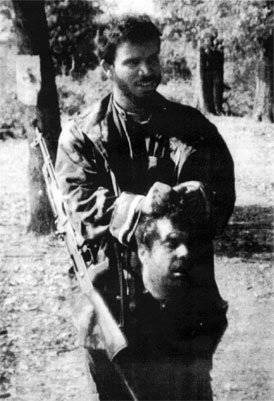 A Mujahid from Saudi Arabia with the head of a murdered Serb under Teslic in Bosnia in 1992.
A Mujahid from Saudi Arabia with the head of a murdered Serb under Teslic in Bosnia in 1992.Bosnia and Herzegovina is a source of new conflicts consciously created by the international community, due to its very political nature.
No peaceful delineation in Bosnia and Herzegovina can occur in principle, because in the same Sarajevo there is a small part of it, located in the territory of the Republika Srpska, but at the same time continuing to remain the de facto part of Sarajevo, in which Muslims completely dominate. Hope for a peaceful exit of this Serbian (now Eastern) Sarajevo from Bosnia and Herzegovina together with the Republika Srpska can only be done by a person who has not seen where this Eastern Sarajevo is located.
A rather difficult situation is also in Doboj, which is part of the Republika Srpska, where 100% returned the “Bosniak” refugees (Bosnian Muslims), so that on its outskirts they are in absolute majority.
Under Predor, in the Republika Srpska, there is a large village of Kozarats with an absolute in number “Bosniak” population, which is close in size to Predor.
One may not even recall Srebrenica, where the mass return of the Bosniaks also took place, because in it, under the influence of the international community, the returned Bosnian Muslims actually left the control of the Republika Srpska.
Accordingly, the withdrawal of the Republika Srpska from Bosnia and Herzegovina, which could occur in the event of a crisis in the financial system of Bosnia and Herzegovina, fully dependent on the assistance of the “international community”, could lead to a number of armed clashes, because Bosnian Muslims are “Bosniaks” no longer the old Yugoslav Muslims.
In addition, the Muslim political parties in Sarajevo, with the exception of the “pro-communist” SDP Zlatko Lagumdzhiya, already have experience in organizing mass nationalist demonstrations and will not fail to head mass demonstrations in Sarajevo in the event of a crisis. Others will be ready to incite demonstrators to attack international organizations and the Serbs in East Sarajevo.
At the same time, such unrest and destabilization of power will open up a wide field of activity for Bosnian supporters of "pure Islam", which are now called "Wahhabis" in the media.
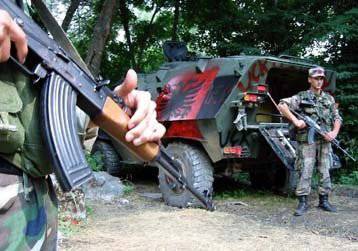 Albanian militants in his BTR.
Albanian militants in his BTR.Now in the Balkans, the Albanians are the main threat. Who benefits from arming and sponsoring the Albanian side?
Yes, the same, in whose interests the Albanian drug mafia works.
The strength of the Albanians was in their organization on the basis of descent - brotherhood - "fis", in turn, according to the White Paper of the Serbian Ministry of the Interior, which provided the basis for the creation of an organized criminal group, which in that case had not one, but several bosses and united with others the same organized criminal group under the leadership of several political leaders. In fact, it was impossible to draw a line between the politician, the militant commander and the mafia boss.
Such an organization ensured, on the one hand, the survival of the Albanian mafia, and on the other, its discipline. According to Interpol, even during immigration to Western Europe and North America (for example, according to the White Paper of the Serbian Ministry of Internal Affairs, by 2000 in the USA and Canada there lived half a million Albanians, in Germany - 400 000, in Switzerland - 200 000, Turkey - 65 000, in Sweden - 40 000, in the UK - 30 000, in Belgium - 25 000, in France - 20 000), the Albanian mafia was able to choose among migrants those who will act in its interests.
The fact that the Albanian drug mafia has gained an important role in Western Europe and in the United States shows that it managed to get support for certain power centers in the West, and this contributed to the split of the drug mafia for economic reasons, because one part of it was sent to the United States and another to western europe.
There is no division between the Albanian separatists and the Albanian drug mafia. The one who created the conditions for the unpunished actions of the Albanian drug mafia in the United States, Switzerland and Germany, and condones the independence of Kosovo.
This is not surprising, given that the Rothschild family is behind the plans for Kosovo’s independence. The latter, according to the article "Occupation of the Rothschilds" by author Vlado Singelić ("Rotšildova okupacija". Vlada Sinđelić. Sajt Dejana Lučića), has governed the political scene of the former Yugoslavia through its "agents of influence" Norman Lamont, Peter Mendelssohn, Oliver Litvina, the figure, Olivera Litvina, in the beginning of the new century, through its "agents of influence" Norman Lamont, Peter Mendelson, Oliver Litvina, the influence of Boris Berezovsky and Vernon Jordan, while in Serbia itself, in addition to the official Serbian politicians of all parties and ideologies, such political cadres as Sonia Likht, Latinka Perovic, Natasha Kandich, Philip David, Sonia Biserko, Biljana Kovacevic-Vucho played an important role. , Borka Pavichevich, Milenko Dereta, Syrdzha Popovich, Bilyana Syrblyanovich, Petar Lukovich, Teofil Panchich, Zoran Ostoich, Mirko Djordjevic, Voin Dimitrievich.
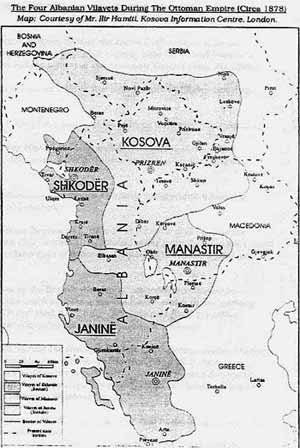 Map of "Greater Albania".
Map of "Greater Albania".In such conditions, according to the work of US Kosovo Policy Is Bad for Israel by American author James Jatras and Serbian author Serge Trifkovic in Perspectives Papers magazine (No. 35, November 6, 2007), hopes some Serbian circles to support the "Jewish" lobby in the United States, which allegedly wanted to help Serbia in the Kosovo issue were meaningless.
Just such oligarchs as the Rothschilds ruled this lobby, and according to the article "Occupation of the Rothschilds" Vlado Singelich, the interests of the Rothschilds demanded the creation of an independent Kosovo as their new colony. The administration of this colony, the Rothschilds, according to Singelich, was entrusted to Sorosh, who, in turn, attracted people like Alexander Mashkevich, Ekrem Luka, Bedzhet Patzoli, Velton Suroi to this cause.
The latter managed Kosovo together with the Albanian mafia, established in the 70-80 years in the United States and in Western Europe, based on the distribution of drugs coming through the then well-known Turkish channel that went through the former Yugoslavia. Accordingly, those in whose interests this drug mafia spread drugs in the West retained full control over it even after it had gained control over the whole power.
In Kosovo, the power of the Albanian mafia was absolute. In June, 2003, the then port-parol of UNMIK police Barry Fletcher, told the press that the main obstacle for UNMIK police was the Albanian mafia, deeply rooted in Kosovo.
According to the White Book of the Serbian Ministry of Internal Affairs, virtually all of Kosovo was ruled by criminal clans, of which the most influential was the Drenica clan, headed by Hashim Thaci, and then followed the Dukagin clan (Metohija region) led by Ramush the Haradinai and the Laba clan (Gnjana district) in led by Rustem Mustafa, who subordinated smaller clans created on a family basis (clans Yashari, Haliti, Luke, Selimi, Vokshi, Lyata, Kelmendi, Elshani, China, Suma, Sulya, Agushi, Getsi, Babaliya, Musai). Often these clans entered into conflicts ending in murder and injury. Thus, Ramos Haradinaj was wounded in a clash with the Musai clan, who, according to the White Paper, had lost to one of its members.
With independence, Kosovo quickly turned from a transit channel to a heroin processing center that came from Turkey, which caused a drop in its prices. Over time, Albanians were increasingly taking control and drug trafficking in Montenegro, Macedonia, Bosnia and Herzegovina, and Serbia, using Albanian communities there, as well as “democratic reforms” that weakened the police in these countries.
In Western Europe, according to the American DEA, the Albanian mafia has become the leading force in drug trafficking, whereas in the US it has become one of the leading drug trafficking groups.
In addition, the Albanian mafia actively engaged in the illegal transfer of people from the Near and Middle East and Africa to Europe, and also controlled a large part of the prostitution market in several European countries, organizing recruitment in Kosovo, as well as in the former Yugoslavia and the former USSR product for this industry.
In Kosovo itself, a large number of brothels were opened, they acted under the guise of strip bars, in which were citizens of Russia, Ukraine, Moldova, Romania, Bulgaria, Bosnia and Herzegovina, and several other countries.
Interpol conducted an extensive investigation into the activities of the Albanian mafia, both in Kosovo and in neighboring Bosnia and Herzegovina, and in Montenegro. According to Interpol, whose commission met in Lyon 20 and 21 in November 2008 of the year and got into the press in 2011 ("Balkanska mafija". Dženana Karup-Druško.Magazin "Dani". 15.04.2011) only in Bosnia and Herzegovina, the Albanian mafia headed by from the Furnace to Kosovo, Nasser Kelmendi conducted large quantities of drug trafficking in the vast Kosovo, Montenegro, Bosnia and Herzegovina, as well as throughout the former Yugoslavia and in many countries in Western Europe and the UAE.
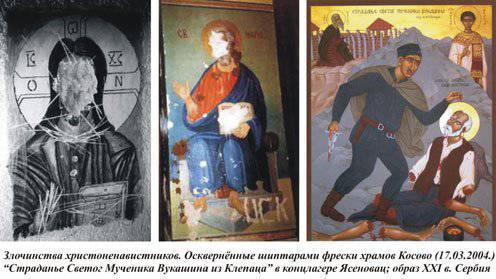 According to the article "Hoop around the criminal organization Kelmendi", published in the 780-th issue of the magazine "Free Bosnia" ("Obruč oko zločinačke organizacije Keljmendi". Broj 780. "Slobodna Bosna".), Police forces of seven European states supported by the FBI, The general leadership of the Interpol Bureau in Lyon in 2011 was the operation of the "Bes" operation against the organization of the drug mafia, headed by Kosovo Albanian Nasser Kelmendi (leading the activities of his organized criminal group from Sarajevo) and Montenegrin Muslim Safet Kalic.
According to the article "Hoop around the criminal organization Kelmendi", published in the 780-th issue of the magazine "Free Bosnia" ("Obruč oko zločinačke organizacije Keljmendi". Broj 780. "Slobodna Bosna".), Police forces of seven European states supported by the FBI, The general leadership of the Interpol Bureau in Lyon in 2011 was the operation of the "Bes" operation against the organization of the drug mafia, headed by Kosovo Albanian Nasser Kelmendi (leading the activities of his organized criminal group from Sarajevo) and Montenegrin Muslim Safet Kalic.During the joint operation of the Central Investigation Agency - SIPA, the Office of the Public Prosecutor of Bosnia and Herzegovina and the Republika Srpska police in September 2012 in Bosnia and Herzegovina, it turned out that Naser Kelmendi, an Albanian from Kosovo, was a key figure in criminal circles. Nasser Kelmendi has long been known in the former Yugoslavia as one of the leaders of the Albanian drug mafia, controlling a significant part of the transit of drugs from Kosovo through Montenegro and Bosnia, so it is in the black list of the US State Department.
In this case, it turned out that Kelmendi supplied drugs, primarily heroin, to local organized crime groups, regardless of their nationality, both bosniaks and Serbs. He actually led a number of organized crime groups in Bosnia, including in the Republika Srpska, giving out lots of drugs "in debt."
Just Bosnia and Herzegovina, according to the materials of the international group on the fight against drugs, which met in Dublin, then became the regional center for drug trafficking to Europe. Kalic himself was described in the White Paper of the Serbian Ministry of the Interior as a member of the so-called Zemun clan, which was essentially a group of Serbian Interior Ministry officials and local Belgrade gangsters, in which he was responsible for bringing heroin from Kosovo.
The center of the OCG Kalic, which had hundreds of members, was the town of Rozhai on the border with Kosovo and, as stated in the document of the Montenegrin Police Department "Evaluation of organized crime", Rozhay was the center of the drug business in Montenegro. Heroin, which according to various estimates was billed per tonne per year, was transferred from neighboring Kosovo and Rozhai to Rozai. It was further distributed through Montenegro, Bosnia and Herzegovina, Serbia and into the countries of the European Community. According to the article "Hoop around the criminal organization Kelmendi," Kelmendi and Kalic worked closely with the native of Montenegrin Plevliv Darko Saric, associated with former members of the "Zemun clan" in Serbia, who were also under investigation both by the Serbian police and Interpol, as well as by the Bosnian oligarch Fakhrudin Radonchich and with the former commander of the forces of the Army of Bosnia and Herzegovina in Srebrenica Naser Orić, as well as with many other "businessmen" from Montenegro, Bosnia and Herzegovina and Serbia. In Kosovo, Kelmendi funded the political party Ramush Haradinaj, but also maintained contacts with Hashim Thaci.
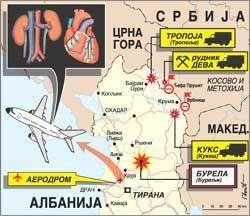 Who was entrusted with this power was found in the West only in 2010, when a scandal erupted in the EU parliament, when a deputy from Switzerland announced the facts of trafficking in human organs held in Kosovo.
Who was entrusted with this power was found in the West only in 2010, when a scandal erupted in the EU parliament, when a deputy from Switzerland announced the facts of trafficking in human organs held in Kosovo.In Pristina on November 15 of November 2008, Israeli citizen Moshe Harel was arrested for organizing a sales network for organs of the body from the Medicus clinic. Surgeons Zapi Shapira from Israel and Yusuf Ertsin Sonmez from Turkey also worked in this clinic, managed by Arban Dervishi.
As it turned out, an illegal organ transplant was performed at the Medicus Clinic, with donors being citizens of such countries as Russia and Turkey, lured by false promises to Kosovo. According to Interpol, five Kosovo Albanians also participated in the organization of this crime, one of whom was a close relative of Hashim Thaci.
Since the clinic was located in Pristina and was widely known here, during the scandal that began, the then Kosovo leadership, led by Hashim Thaci, put pressure not only on witnesses, but also on the judicial authorities, which remained under the control of the EU EULEX mission. As a result, the scandal was nullified, especially since the facts of illegal trade in organs, during which donors were subsequently killed, began to appear outside of Kosovo.
Where, after the defeat of the Albanians in the aggression against Macedonia, the next military conflict may arise?
In the north of Kosovo and in the Presevo Valley in the south of Serbia.
The current disintegration of the SFRY was laid under Tito, and Milosevic did not play such an important role here, as the 2001 events of the year showed when he was overthrown and then gave his own nomenclature to The Hague. Obviously, the process will not stop there and the situation in Kosovo will sooner or later lead to a new war with an even worse outcome for the Serbs. There is no need for a prophet here, because if the Albanian side demands complete sovereignty over Kosovo, while Belgrade supports Serbian areas, primarily in the north of Kosovo, does not submit to Pristina, then this problem can be solved only by a force scenario. And it makes no sense to give references, except for the fact that it is precisely for this reason that the Serbian army is reduced to three tens of thousands of servicemen.
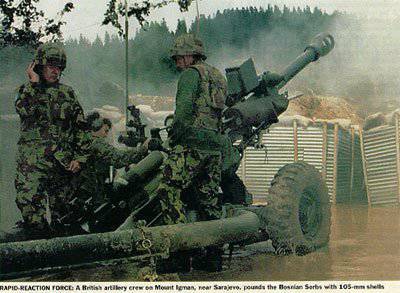 Artillery of the British Army fires Serb positions near Sarajevo in 1995.
Artillery of the British Army fires Serb positions near Sarajevo in 1995.What are the main causes of the war in Yugoslavia? Is it only the desire of a branch to independent states?
This war was programmed by the creation of Yugoslavia 1945 and the policies of Josip Broz Tito, who made it completely dependent on the West and its credits. The one who pays is the one who orders the music.
Has anyone approached you from the Russian Army or the special services for experience - to be an advisor or expert on these wars?
Not. I have the impression that they know everything, they know everything and everyone can, to which I am only glad.
Another thing is individuals, among whom there are a lot of officers - from special services or special forces, I don’t know, but they don’t represent their organizations in this case, although I hope my books will add knowledge to them.
The exception is the new US and NATO strategy book, which has a chapter on Private Military Companies that I wrote in 2004. I served on this topic as a kind of lecturer to various Russian security structures, but everything ended after they received the information.
Do you think peace is possible in the Balkans? Under what conditions is this possible?
I think no.
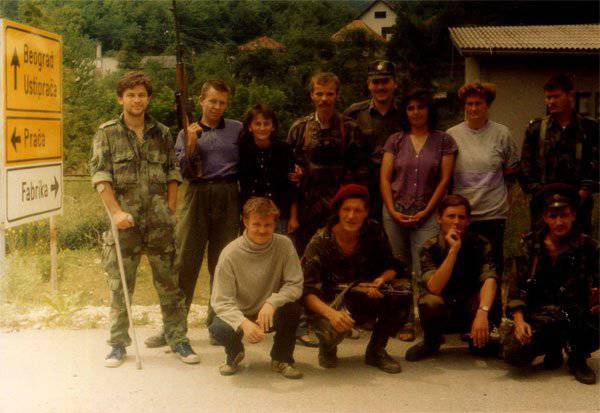
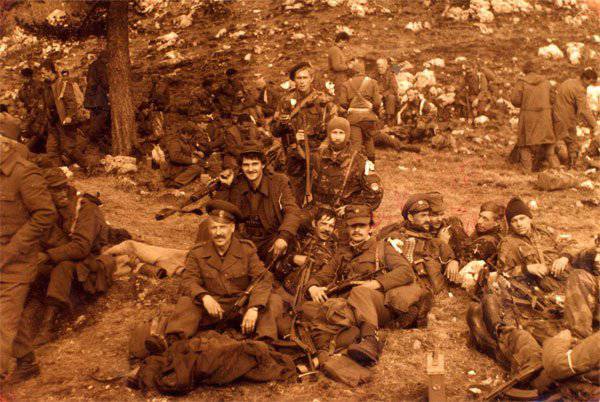
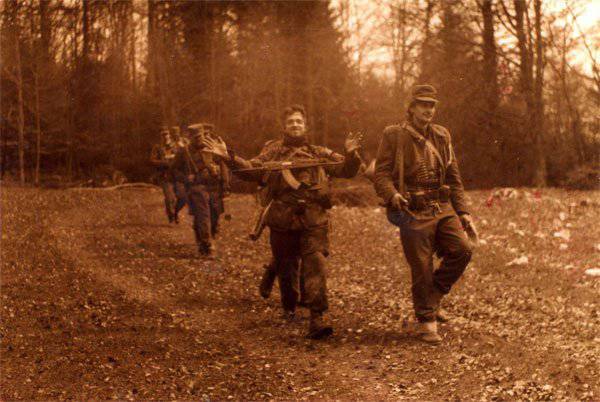
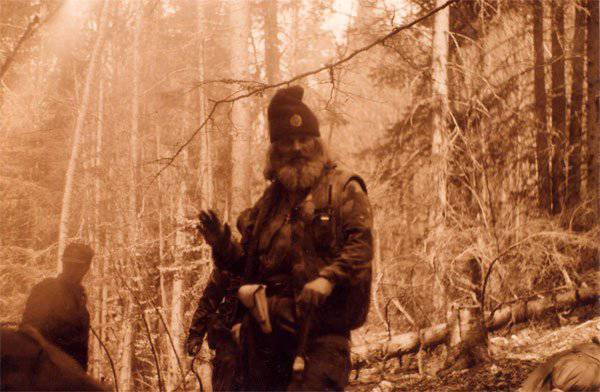
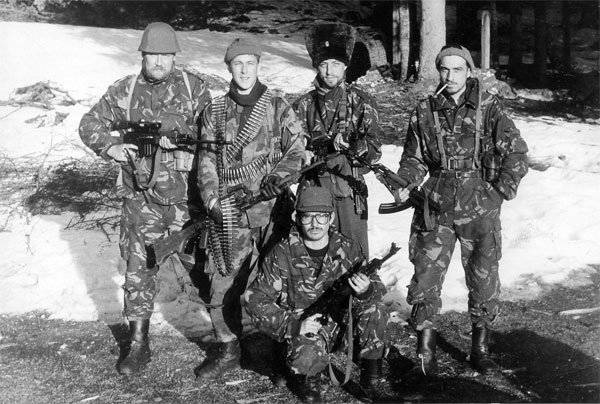
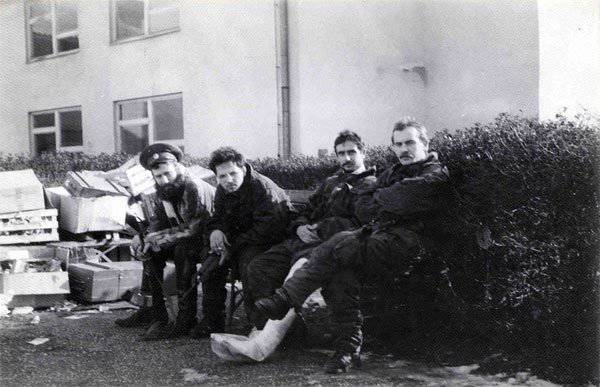
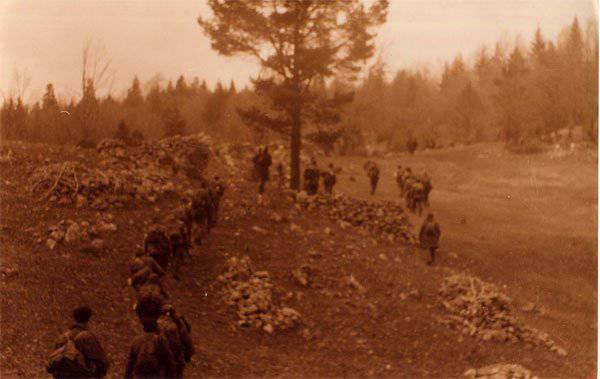
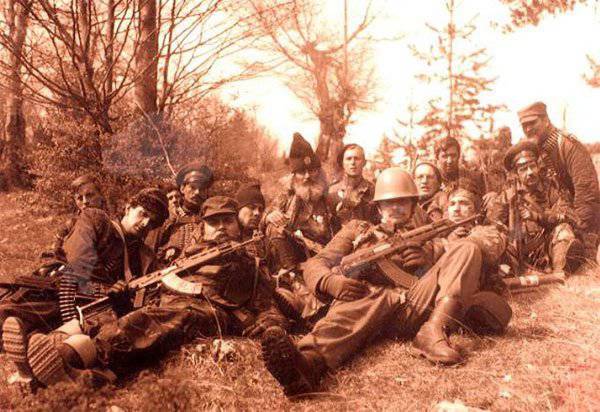
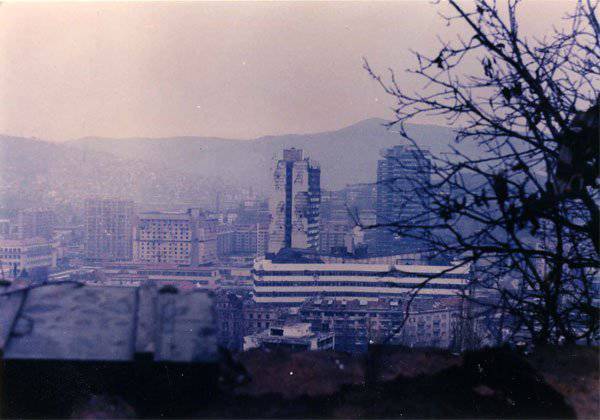
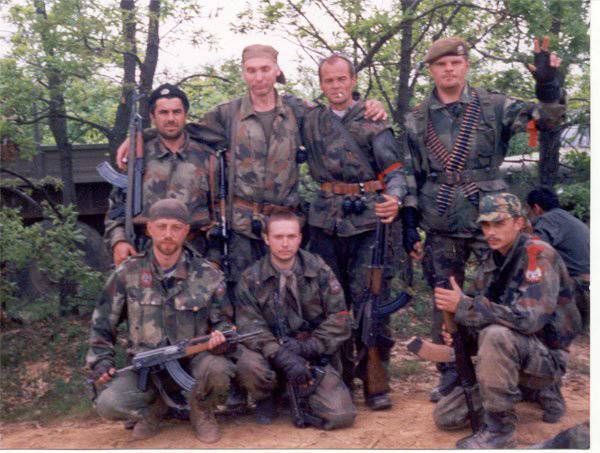
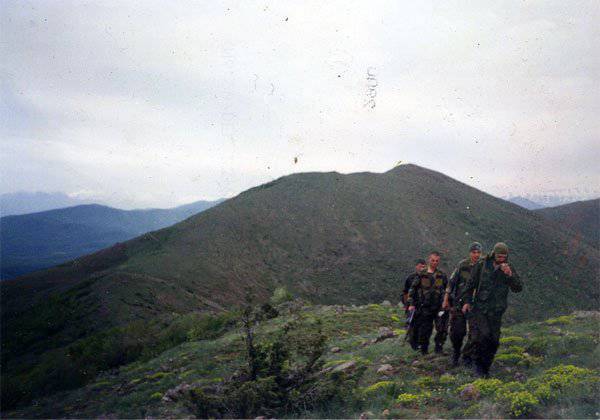
Information